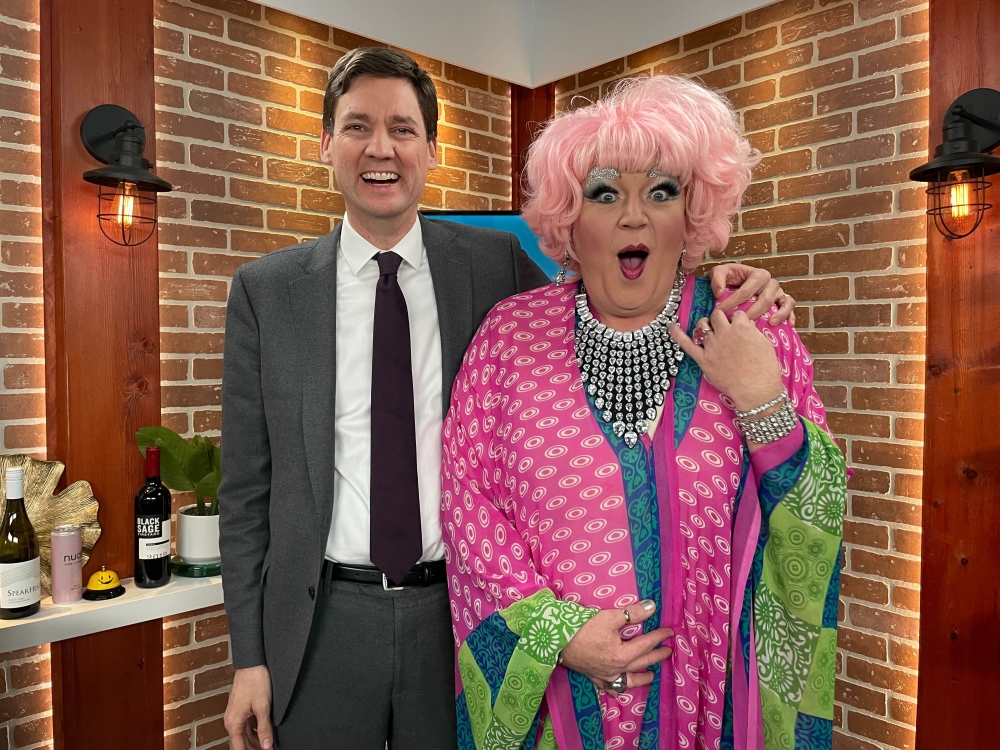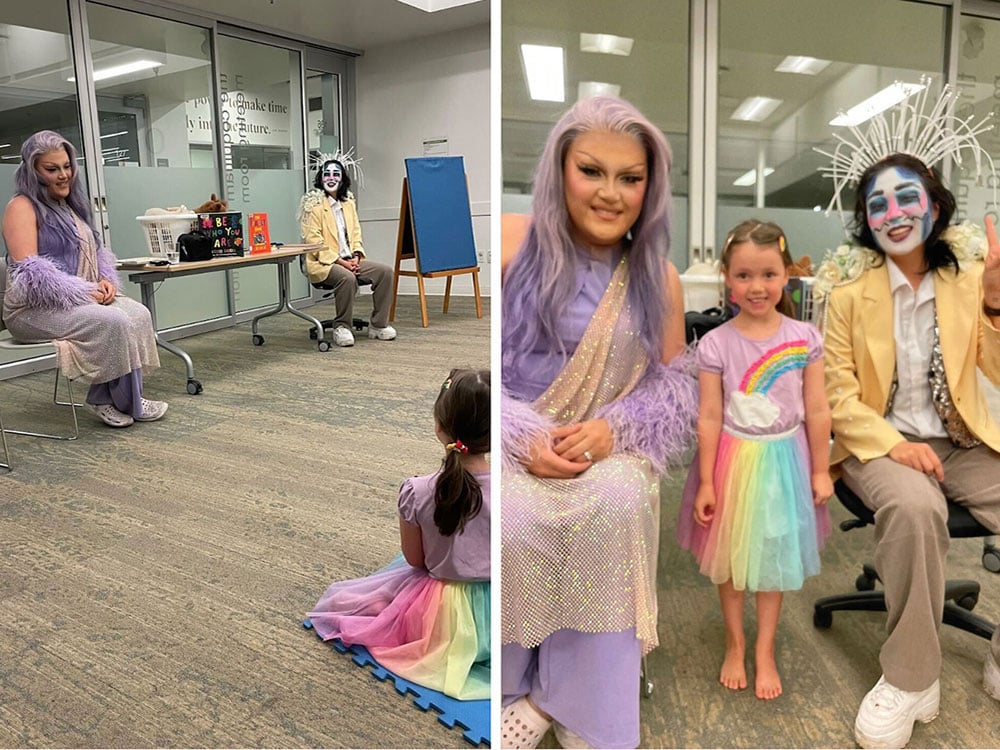When Cheryl Trade, dressed in a purple jumpsuit and lavender wig, reached the bottom of a stairwell in a suburban parkade, she was met by a group of police officers.
The officers had been expecting her arrival and were there for her safety.
Earlier in the summer, one of her colleague's drag story times was interrupted by protesters in Richmond. With no police on scene, a man pushed through parents and kids to snap photos of Miss Gina Tonic, the drag queen hosting the reading.
Trade was told in advance about the protesters who planned to show up to her event. But she wasn’t deterred by their presence.
She felt a responsibility to the children in attendance. Having grown up in a small northern Saskatchewan community, Trade would have jumped at the chance to have someone tell her that it’s okay to be different.
As she followed the police across a tiny crosswalk, she glanced towards the two opposing groups that had formed outside the Coquitlam Public Library on a late August day last summer.
To her left, a group of people dressed in rainbow colours shouted their support for her.
To her right, a smaller contingent yelled that Trade was going to hell and that God was going to punish her.
“I just smiled, waved and walked right on,” Trade said. “The police didn’t want me to stop and engage because of safety issues.”
Trade has performed as a drag queen for nearly a decade. She says she likes to bring her Indigenous identity into her shows, such as teaching audiences Cree words. She hopes to one day incorporate hoop dancing into her shows — a form of dance she learned in childhood.
She has hosted drag story time events for young people since 2018, but this was the first time she needed a police escort.
The Coquitlam event brought more than 70 families to the library and went on without disruption. Trade read a series of age-appropriate books and sang children’s songs to toddlers and their parents — one child even praised her purple jumpsuit and called her a princess.
But as she was escorted out of the library, back to her car on the top floor of the parkade, she had to fulfil one more safety request: let the library know when she made it out of town.
“I texted the contact at the library to say, ‘I’m back on the highway to Vancouver, thanks for everything,’” Trade said.
“I was very thankful for the safety measures the library put in, but it’s crazy to me that this is what is needed now.”
From Shakespeare to library time
The history of drag dates back to at least the 16th century. In that time, many men were asked to play female roles in Shakespeare plays because of rules forbidding women from acting in a play.
While the origin of what sparked the term “drag” is debated, most pundits agree that it may have been a reference to how the male actors’ dresses dragged onstage. Another popular, unproven theory was that writers would make script notes with the word “DRAG” to indicate that an actor should “dress as a girl.”
As drag culture grew, it became linked to the LGBTQ2S+ community.
In the 19th century, the term “drag queen” was conceived by gay British men in the theatre community. A 1927 Manual of Psychiatry also defined drag as “an outfit of female dress worn by a homosexual.”
By 2015, a new event, Drag Queen Story Hour, was launched in San Francisco to promote reading and diversity. The concept was to have children listen to stories and join a singalong led by a drag queen.
But in recent years, the lighthearted events have been thrust into a culture war against groups who are reviving a belief made popular in the 1970s that LGBTQ2S+ people are grooming children in attempt to sexually abuse them or make them into members of the queer community.
Over the weekend of Jan. 14, three different drag events — from a drag brunch to a drag story time — were protested outside of libraries and restaurants across the country.
One of the January 2023 protests occurred at a drag story time at the Coquitlam Public Library, the same venue where Trade read in August. Like the first reading, supporters outnumbered the number of protesters.
That weekend, they were there to back drag queen Conni Smudge, who had previously had an incident with a man who made inappropriate remarks at her North Vancouver story time in the fall.
When Smudge arrived at the Coquitlam Public Library, she said counter-protesters drowned out the protesters who were there to disrupt the reading.
“Our music was louder, our speaker was louder, my blow horn was louder,” Smudge said. “It was like a gay pride [parade] in January.”
Samantha Wink, communications and marketing manager at the Coquitlam Public Library, said part of the library’s mission is to promote inclusivity. Wink added that a majority of email responses and backlash to the event came from people living outside of Coquitlam.
After a staff member suggested they invite Smudge to host a drag story time, the library sat down with a small group of Coquitlam residents who reached out for a meeting. Wink reassured them that the event was age-appropriate and not part of a wider agenda.
“Mostly they’re about acceptance,” Wink said. “Accepting yourself as who you are, what your differences might be and the differences of others.”
The event is also just one of the many ways the library aims to spread that message.
In other readings, they have invited local Indigenous Elders to tell stories about their community, speakers who provided insight about the criminal justice system and organizations that support people with disabilities.
“In the case of a drag story time, we saw that as a great time for families to help model inclusiveness, kindness and acceptance for their children,” Wink said. “While also promoting a love of reading.”
‘I couldn’t really be myself’
As a kid, Chris Bolton felt like a square peg trying to fit into a round hole. Growing up in North Vancouver in the 1970s, Bolton, who performs as Conni Smudge, loved to dress up and perform.
He hosted plays in his childhood home after dinner on Sunday nights.
He put tea towels on his head to make it seem like he had glamorous blond hair.
He sang the theme song to WonderBra commercials — “When I like what I see, I enjoy being me…. Wonderful, wonderful, WonderBra” — as it ran on his family’s television.
Those activities were accepted at home. Although, for 20 years, Bolton notes that his parents thought he would marry and start a family with a woman. Still, home was where he felt like he could be his true self.
At school and any other public setting, he had to dress and act like a boy. He longed to have a role model show him that it was alright to be interested in singing and dressing up like a girl.
“I couldn’t really be myself,” Bolton said. “I knew if I played dress up [with others], I had to dress up as a boy.”
In his early 20s, a friend brought Bolton to a gay bar for the first time. It was there that he found a community of people who made him feel like he could be his true self. When he was introduced to drag shortly after that night, he enjoyed performing. But he also wanted to host children's events, such as story times, that may help kids who are struggling with their identity.
“As a kid, I was always told I was wrong and didn’t belong. So if I can be a beacon of light for some little Chris Bolton out there, little Conni Smudge who doesn’t know who they are yet, that’s totally cool.”

Two provinces away and some 20 years after Bolton’s childhood, Jordan McKay, who performs as Cheryl Trade, also grew up without any diverse role models in the town of Lac La Ronge, Saskatchewan.
As a child, McKay was interested in the arts, playing instruments, composing songs and jamming out with McKay’s stepdad’s band. Despite this wide-ranging interest in the arts, McKay similarly felt pressure to play sports and conform to other masculine social norms.
Now, like Bolton, McKay wants to help a younger generation of people see themselves and feel affirmed for who they are.
“I was always expected to go outside and play soccer, football and hockey with all of the boys,” McKay said. “I wanted to play dolls with the girls inside, and I wasn’t allowed to.”
Protests, then counter-protests
Although counter-protests have often outnumbered those against drag story time events, there is still a segment of people in the province who aim to disrupt the readings.
On Jan. 15, a Kelowna resident started an online petition against a drag story time slated for the downtown Kelowna library. The petition racked up 2,500 signatures before it was removed from the Change.org platform due to “hate speech.”
A counter-petition in support of the library’s decision to host the story time racked up over 3,000 signatures.
Sydney Richardson-Carr, a Kelowna resident who launched the petition, told The Tyee over email that she believes story time events teach children about diverse perspectives and show them that they can strive to be whoever they want to be when they grow up.
“I wanted people in support of the event to show that they can have a voice as well,” Richardson-Carr wrote. “Love, open-mindedness and freedom of expression are supported by a vast majority of people.”
Both Bolton and McKay believe that the pandemic and political influence from the U.S. have spurred the misconception and hate towards drag story time readings in Canada.
McKay believes that people were sick of being isolated at home and are now more likely to lash out against ideas they don’t agree with as communities move into a post-pandemic world.
McKay adds that men dressing up as women and vice versa has been happening in popular culture for years. But since it’s queer artists leading drag events, such as story time readings, it has been a political inflection point.
“No one got all crazy when Robin Williams played Mrs. Doubtfire. That’s a heterosexual man playing an old woman on TV and he received awards for it,” McKay said.
In story times, McKay said, drag queens will read books that are pre-approved by librarians and sing common children’s songs such as “Twinkle, Twinkle, Little Star.”
But Bolton says that most of the misconceptions around the event — that drag queens are grooming children to become gay — come from people who have never attended a story time. In his readings, compared to a weekend show, he adjusts his clothing and attitude to suit a younger audience.
The Coquitlam Public Library has voiced support for hosting another story time in the future.
Wink, the communications and marketing manager at the Coquitlam Public Library, notes that libraries strive to be a safe, non-judgmental space. They can bring together people from all walks of life to learn from one another.
“One of the only inoculations towards hate is knowledge,” Wink said.
Neither McKay nor Bolton plan on turning down opportunities to host story times. Bolton has plans to host another reading in North Vancouver in March.
Ultimately, McKay believes that kids don’t think of any ulterior motives when he performs. If a parent decides to bring their children to Cheryl Trade’s drag story time, Cheryl will make sure they feel included and seen — two feelings McKay sought for years. ![]()
Read more: Rights + Justice, Gender + Sexuality
















Tyee Commenting Guidelines
Comments that violate guidelines risk being deleted, and violations may result in a temporary or permanent user ban. Maintain the spirit of good conversation to stay in the discussion.
*Please note The Tyee is not a forum for spreading misinformation about COVID-19, denying its existence or minimizing its risk to public health.
Do:
Do not: